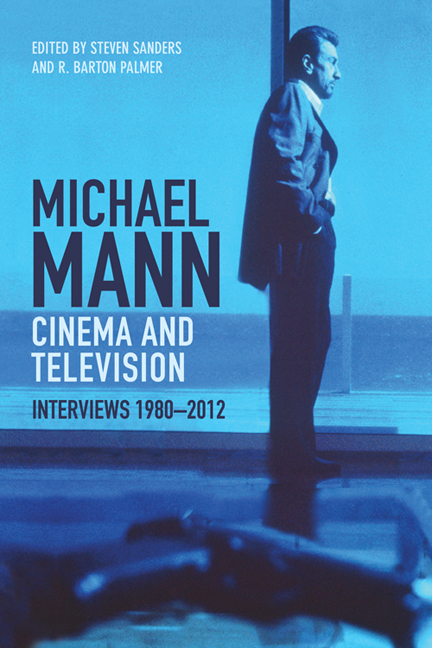Book contents
- Frontmatter
- Contents
- List of Illustrations
- Acknowledgements
- Introduction: Michael Mann in His Interviews
- 1 Four Minute Mile
- 2 Castle Keep
- 3 Of Vice and Mann
- 4 Manhunter: An Interview with Michael Mann
- 5 Michael Mann: Hollywood Writer–Director–Producer
- 6 Mann and His Movies
- 7 All the Corporations’ Men
- 8 Smoking Gun
- 9 “Ali Likes the Film a Lot. He's Seen it Six Times”
- 10 Paint it Black
- 11 Mann Among Men
- 12 L.A. Belongs to the Coyotes
- 13 Michael Mann Interview
- 14 A Mann's Man's World
- 15 Number One with a Bullet
- 16 The Study of Mann
- Chronology
- Filmography
- Publisher's Acknowledgments
- Index
15 - Number One with a Bullet
Published online by Cambridge University Press: 05 September 2016
- Frontmatter
- Contents
- List of Illustrations
- Acknowledgements
- Introduction: Michael Mann in His Interviews
- 1 Four Minute Mile
- 2 Castle Keep
- 3 Of Vice and Mann
- 4 Manhunter: An Interview with Michael Mann
- 5 Michael Mann: Hollywood Writer–Director–Producer
- 6 Mann and His Movies
- 7 All the Corporations’ Men
- 8 Smoking Gun
- 9 “Ali Likes the Film a Lot. He's Seen it Six Times”
- 10 Paint it Black
- 11 Mann Among Men
- 12 L.A. Belongs to the Coyotes
- 13 Michael Mann Interview
- 14 A Mann's Man's World
- 15 Number One with a Bullet
- 16 The Study of Mann
- Chronology
- Filmography
- Publisher's Acknowledgments
- Index
Summary
Michael Mann is talking about the last two hours of John Dillinger's life, as the infamous and charismatic midwestern bank-robber sat in the Biograph movie theater in Chicago, watching Clark Gable playing Blackie Gallagher, a suspiciously Dillingeresque criminal, in WS Van Dyke's Manhattan Melodrama. “There's even a reference to Dillinger in the early part of the movie!” says Mann. “Imagine being John Dillinger sitting there in the movie house. All your friends are dead; your woman, the true love of your life, is gone. There's fewer and fewer people like you any more. You're facing these gigantic evolutionary forces trying to crush you – organized crime on the one hand and the FBI on the other. And the end is near. You're not a sentimentalist about it – you don't think you're going to live for ever anyway. And you, Dillinger, are sitting there and Clark Gable delivers these words to you, while unbeknownst to you, less than 75 feet away there are 30 FBI agents out there planning to kill you.”
John Dillinger, the Indiana farm boy who robbed more banks than historians can now count, and busted out of not one but two jails, was and remains intimately linked with the movies. He didn't just like Clark Gable movies – he looked like Clark Gable. It is said that he copped his signature move of vaulting elegantly over a bank's counter, one hand on the wood, the other clutching a huge Thompson machine gun, from some Warner Brothers gangster movie or other. Having spent the years 1924 to 1933 – the whole of his 20s – rotting in an Indiana penitentiary for a drunken, botched mugging he always regretted, he was insatiably hungry for life and whatever it could offer in the depths of the Great Depression. Money, women, excitement – sure, he got all these and more in the headlong, event-filled last 13 months of his life, but he also loved the movies, which had gone from silent to sound while he was inside, and he went as often as he could manage.
One scene in Public Enemies, Mann's tremendously gripping account of Dillinger's criminal career, shows him watching a newsreel about himself in a crowded cinema.
- Type
- Chapter
- Information
- Michael Mann - Cinema and TelevisionInterviews, 1980-2012, pp. 109 - 116Publisher: Edinburgh University PressPrint publication year: 2014



